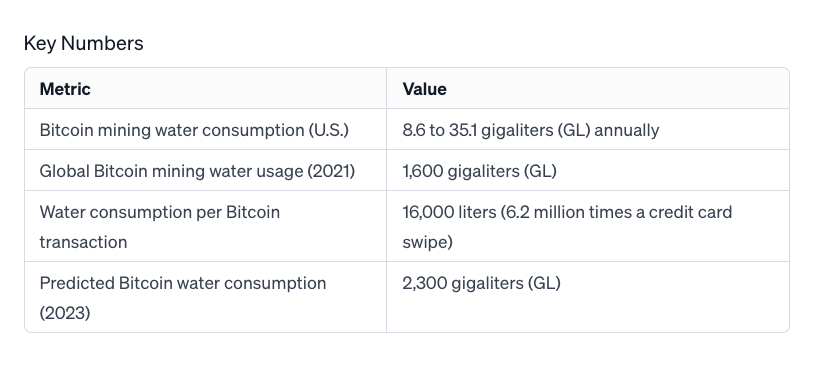Is Bitcoin thirsty? 💦
Bitcoin takes up six million times higher than credit card transactions? As water scarcity looms, Bitcoin's environmental impact sparks a global debate. But wait, is that correct?
Hello, y'all. Get your Sunday music grooves with 👉 Asset - Your Music Stats.
This Sunday, a gentle reminder - love earth, live life ✌️👇🏻
This is The Token Dispatch, you can hit us on telegram 🤟
Bitcoin's back in spotlight. It's been on the ride up.
Have ya seen the charts?
Bitcoin has also been in the news all over for other reason.
Bitcoin's water threat to the environment.
Wait, what happened?
Mainstream media has raised the alarm bells over Bitcoin's water usage👇🏻
How did this happen?
Financial economist and Dutch National Bank data scientist Alex de Vries has raised concerns about the significant water consumption associated with cryptocurrency mining, particularly Bitcoin.
In a study published in the journal Cell Reports Sustainability, he explores the growing issue of Bitcoin's water footprint and its potential threat to global water supplies, especially in water-scarce regions.
De Vries, a PhD student at Vrije Universiteit Amsterdam, highlights the burgeoning issue of Bitcoin’s water footprint.
“Many parts of the world are experiencing droughts, and fresh water is becoming an increasing scarce resource. If we continue to use this valuable resource for making useless computations, I think that reality is really painful.”
So, why is Bitcoin causing this aquatic uproar?
It all boils down to the massive amount of computing power required to keep the cryptocurrency ticking.
These power-hungry machines demand electricity, and a significant portion of electricity generation relies on water for cooling.
Bitcoin consumed 1,600 billion litres (or gigalitres) of water in 2021. That's like draining an entire lake.
Bitcoin's Water Consumption
Bitcoin miners globally compete to solve mathematical equations, with the process consuming massive amounts of computing power.
Miners collectively generate approximately 350 quintillion guesses per second, leading to extensive computational waste.
Water Usage in Data Centres
Large data centres, integral to the mining process, use significant amounts of water for cooling their computers.
De Vries estimates that Bitcoin mining in the U.S. consumes 8.6 to 35.1 gigaliters (GL) of water annually from data centres.
Impact of Power Plants
Power plants, supplying electricity for mining, use water for cooling, contributing to Bitcoin's overall water footprint.
In 2021, global Bitcoin mining used over 1,600 GL of water, with each transaction consuming 16,000 litres of water on average.
Quantifying the Impact
Annual water consumption for Bitcoin mining in the US ranges from 93 GL to 120 GL, equivalent to the water usage of 300,000 American households or a city like Washington, DC.
Each Bitcoin transaction consumes about 6.2 million times more water than a credit card swipe, contributing to the environmental toll.
Regional Implications
Countries like Kazakhstan, a major mining hub, are already experiencing water shortages due to Bitcoin transactions.
In the US, Bitcoin mining exacerbates water scarcity concerns, using resources without contributing to productive purposes like artificial intelligence.
Water, Bitcoin, and the Future
As Bitcoin's demand for water rises, the global water crisis, especially in drought-prone areas, could be exacerbated.
A wake-up call, urging a reassessment of the environmental costs of emerging technologies like Bitcoin in alignment with global sustainability goals.
De Vries proposes solutions such as modifying mining software to reduce power and water requirements.
Incorporating renewable energy sources like wind and solar is suggested to lessen Bitcoin's water footprint, though caution is advised against diverting these resources from essential uses.
The Counter to Claim
De Vries' claims were picked for loopholes, and media criticised for not painting the complete picture.
Daniel Batten, founder of CH4-Capital, a startup that aims to remove methane from the atmosphere, called it journalistic laziness and called it out for inaccuracies.
Batten posted on X (formerly Twitter) … read the whole post #gold
"De Vries has a history of making predictions which have proven wildly inaccurate. Rather than acknowledge error and move on, De Vries has simply pivoted his attack into other areas … Now that it is clear Bitcoin's major energy source is not coal (as De Vries had falsely claimed) but hydro, Bitcoin is suddenly bad for using too much water."
De Vries' history of being Bitcoin critique
Recent findings reiterate his earlier critiques of Bitcoin, focusing on the energy consumption associated with bitcoin mining.
His tech research platform, Digiconomist, maintains a record of the environmental footprint of each bitcoin transaction, equating it to "808,554 Visa transactions or 60,802 hours of watching YouTube."
Critics argue that calculating the energy cost per bitcoin transaction lacks relevance without additional context.
Cambridge University's Center for Alternative Finance highlights that "transaction throughput is independent of the network’s electricity consumption."
They assert that increasing mining equipment and electricity consumption does not impact the number of processed transactions.
Digiconomist's credibility was called into question in 2017 when it predicted that Bitcoin would match the world's entire power consumption by 2020.
Estimate parallels predictions from the early 1990s about internet traffic and electricity use, which did not materialise as anticipated.
Batten comes in force with a full defence
Absolute gems in this thread, do read.
TTD Week That Was 📆
Saturday: Mark your calendars 🗓️
Friday: Munger's memecoin riot 🪙
Thursday: Web3's Gaming Voodoo 🐉 🧙
Wednesday: AI's moral compass 🤖
Tuesday: Teng's got a plan 🧠💡
Monday: What’s next for CZ?🔮
TTD Week in Funding 💰
Grove. $7.9 million. Decentralised physical infrastructure (DePIN) provider, previously named Pocket Network Inc.
Setter. $5 million. Consumer app that allows brands to explore Web3-powered commerce.
Coinchange. $10 million. Scale its API-based yield service for bitcoin (BTC), ether (ETH) and major stablecoins.
If you like us, if you don't like us .. either ways do tell us✌️
If you dig what we do, show us love on Twitter, Instagram & Threads🤞
So long. OKAY? ✋












